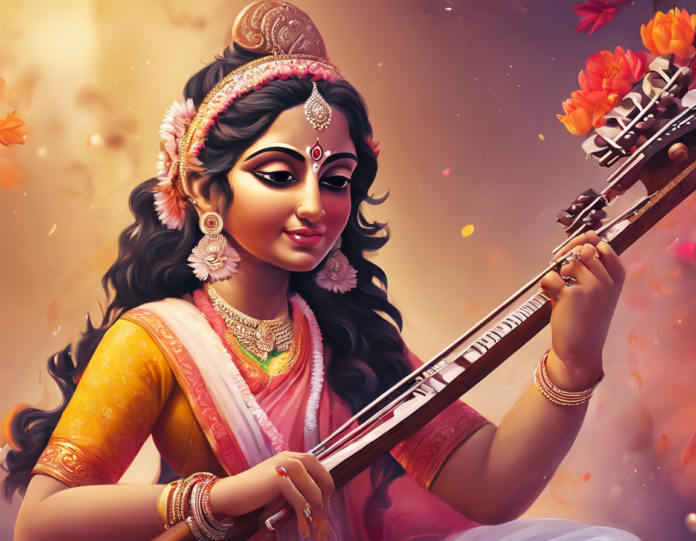Saraswati Puja, also known as Vasant Panchami, is a significant Hindu festival dedicated to Goddess Saraswati, the deity of knowledge, wisdom, art, and music. This auspicious day falls on the fifth day (Panchami) of the Hindu month of Magh (usually in January or February). Devotees across India celebrate this festival with immense devotion and fervor. Let’s delve deeper into the customs, significance, and rituals associated with Saraswati Puja.
Significance of Saraswati Puja
Saraswati Puja holds immense significance in Hindu culture as it celebrates the goddess of learning and wisdom. It is believed that worshipping Goddess Saraswati on this day can invoke her blessings and bestow knowledge, creativity, and eloquence upon her devotees. Students, scholars, artists, and musicians often seek Saraswati’s blessings for success in their academic and creative pursuits.
Saraswati Puja Rituals and Customs
1. Setting Up the Altar (Saraswati Puja Sthapana)
- Cleanliness: Before the puja, the house or worship area is thoroughly cleaned.
- Altar Decoration: A platform or altar is set up, usually adorned with yellow flowers, books, musical instruments, and other items symbolizing knowledge and wisdom.
- Idol/Photo of Saraswati: An idol or picture of Goddess Saraswati is placed on the altar.
2. Invocation of the Goddess (Saraswati Puja Avahan)
- Ganesh Puja: The puja usually begins with invoking Lord Ganesh, the remover of obstacles.
- Mantra Recitation: Devotees chant mantras dedicated to Goddess Saraswati to invite her presence.
- Offerings: Flowers, fruits, sweets, and incense are offered to the goddess.
3. Worship and Aarti
- Puja Vidhi: Various rituals like Saraswati Vandana and Pushpanjali are performed, where devotees offer flowers to the goddess.
- Aarti: A traditional aarti is sung in praise of Goddess Saraswati, accompanied by the lighting of lamps.
4. Prasad Distribution
- Blessings: After the puja, prasad (blessed food) is distributed among devotees as a symbol of divine blessings.
Celebrations Across India
Saraswati Puja is celebrated with great enthusiasm in different parts of India, particularly in West Bengal, Odisha, Bihar, and Uttar Pradesh. In West Bengal, it coincides with the onset of spring, and students often initiate their studies on this day after seeking Saraswati’s blessings. In educational institutions, special prayers and cultural programs are organized to pay homage to the goddess of knowledge.
FAQs (Frequently Asked Questions)
1. When is Saraswati Puja in 2023?
Saraswati Puja or Vasant Panchami in 2023 will fall on Saturday, 28th January.
2. What is the significance of wearing yellow on Saraswati Puja?
Yellow is considered auspicious for Saraswati Puja as it symbolizes prosperity and knowledge. It is believed to invoke the blessings of Goddess Saraswati.
3. Can non-Hindus participate in Saraswati Puja?
Yes, Saraswati Puja is a festival that welcomes people from all backgrounds. Non-Hindus are also encouraged to participate and seek blessings from Goddess Saraswati.
4. What are the traditional dishes offered to Goddess Saraswati?
Khichdi, Boondi, Fruits, Sweets, and Coconut are some of the typical offerings made during Saraswati Puja.
5. Can Saraswati Puja be performed at home?
Yes, Saraswati Puja can be performed at home by setting up a small altar or dedicated worship area. The rituals can be simplified for home celebrations.
6. Is it necessary to fast on Saraswati Puja?
While fasting is not mandatory, some devotees choose to observe a partial fast and consume light meals. The focus is more on seeking knowledge and wisdom from the goddess.
7. What is the importance of Saraswati Vandana?
Saraswati Vandana is a prayer sung in praise of Goddess Saraswati, seeking her blessings for wisdom, knowledge, and success in academic pursuits.
8. Can students seek blessings from Saraswati during exams?
Yes, students often pray to Goddess Saraswati for success and blessings before exams or important academic endeavors.
9. Are there any specific mantras for Saraswati Puja?
Mantras like “Om Aim Hrim Klim Saraswati Devaya Namaha” and “Ya Kundendu Tushara Hara Dhavala” are commonly recited during Saraswati Puja.
10. How long does Saraswati Puja usually last?
The duration of Saraswati Puja can vary, but the main rituals and worship usually take a few hours to complete. Devotees can choose to extend the celebrations based on personal traditions and customs.
Saraswati Puja is not just a festival; it is a celebration of knowledge, arts, and culture. It reminds us of the importance of wisdom and learning in our lives and encourages us to seek the blessings of Goddess Saraswati for enlightenment and success. Embracing the customs and rituals of Saraswati Puja can not only enrich our spiritual practices but also inspire us to pursue knowledge and creativity with dedication and reverence.








